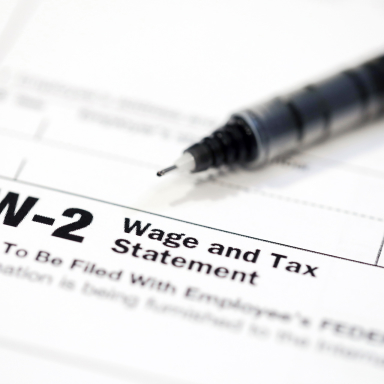Get ready for tax season: An end-of-year checklist for smooth W-2 and 1099 processing in January

Read time: 3 minutes (559 words)
Smart business owners know that preparing for tax season shouldn’t wait until January. Getting your documentation organized now for W-2 and 1099 processing season can save you significant time and stress when filing deadlines approach. Disclaimer: It also saves your accounting firm significant time and stress.
Here’s a handy list to help you get organized, so January can be a breeze for everyone.
Gather essential information
The first order of business is to make sure you have the following details for each employee, vendor and contractor:
W-2 preparation checklist
Employee information
Legal name (as shown on Social Security card)
Current mailing address
Social Security Number
Employment dates (if started or terminated during the year)
State and local tax jurisdictions where the employee worked
Compensation details
Total wages paid
Tips reported
Bonuses and other compensation
Retirement plan contributions
Health insurance premiums (if applicable)
Value of other benefits provided
1099 preparation checklist
Contractor/vendor information
Legal name or business name
Tax identification number (EIN or SSN)
Current mailing address
Entity type (e.g., individual, corporation, partnership)
Payment records
Total payments made during the calendar year
Payment types (e.g., services, rent, royalties)
Dates of payments
Copies of all invoices
Remember critical deadlines
January 31: Deadline to provide W-2s to employees
January 31: Deadline to provide 1099s to contractors
January 31: Deadline to file Forms W-2 and 1099-NEC with the IRS
Plan and prepare with these pro tips
Working closely with your accounting firm can help ensure accurate and timely W-2 and 1099 processing, minimize errors, maintain compliance and avoid potential penalties. Here are some ways to collaborate:
1. Verify information early.
Ask contractors and employees to confirm their information by December 1.
Use the IRS TIN matching program to verify tax ID numbers.
Review and discuss worker classifications to ensure proper categorization.
Update addresses for any contractors or employees who have moved.
2. Reconcile payments.
Keep digital copies of all invoices.
Provide detailed records of all payments made to employees and contractors throughout the year.
Note which payments require 1099 reporting.
Reconcile payments with payroll records and bank statements.
3. Discuss details.
Identify vendors or contractors that operate in multiple states and ensure compliance with state requirements.
Set up a review and approval process to ensure timely submission.
4. Communicate regularly.
Maintain open communications year-round regarding changes to employee status, new contractor relationships or significant payments.
Request that your accounting firm provide updates on any changes to tax laws or reporting requirements that may affect W-2 and 1099 processing.
Get the help you need
Don’t wait until the last minute to get your documentation in order. By taking these proactive steps, you’ll set your business up for a seamless transition into the new year.
Our team of accounting professionals can help you:
Review your vendor and employee records.
Ensure compliance with reporting requirements.
Set up systems for better tracking in the coming year.
Contact us today to schedule a year-end review and make tax season smoother for everyone.

